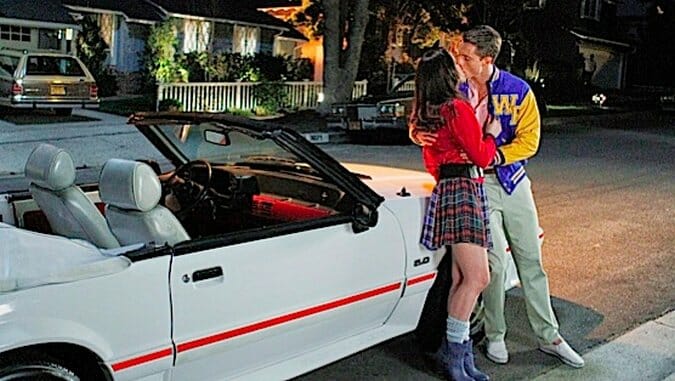
Love can be a many-splendored thing—or, as “The Age of Darkness” demonstrates, it can start as splendored before morphing into something both ugly and painful.
We begin the episode with an oft-moody Erica Goldberg in the midst of a girlishly giddy period following her newly minted relationship with next-door neighbor Drew Kremp. This temporary peace, however, is soon shattered when Drew abruptly breaks up with Erica, sending her into a downward spiral of tears and soul-assuaging sugary treats. Murray’s attempts to comfort his daughter are met with swift jeers. Beverly, meanwhile, can’t help but use Erica’s heartbreak to drum up some serious competition with Drew’s mother, Virginia. Upon seeing that the Kremp boy has already started dating another girl, Beverly sets about trying to help her daughter move on, as well. In a move that would be decidedly un-Beverly in any other context, she even arranges for Erica to go out with a handsome, college-aged guy simply to make Drew jealous.
More so than any episode this season, “The Age of Darkness” provides a major showcase for actress Hayley Orrantia. Because Erica is not given the more broad, eccentric quirks granted to Adam or Barry—excluding the flashbacks to her high-maintenance, overachiever self, that is—the show generally relies on her to serve as the archetypal rebellious teen. Thus, seeing Orrantia move between such wild extremes in the opening minutes was an unexpected treat. What’s more, the sequence in question is just flat-out hilarious, especially when she’s reduced to an incoherent, crying mess that only Barry can properly understand and translate.
Where the episode also hits gold is in the dynamic between Beverly and Virginia Kremp. For their parts, Wendi McLendon-Covey and Jennifer Irwin really build upon the dynamic they demonstrated back in “The Kremps.” In particular, the scenes in which they communicate largely through monosyllabic exchanges demonstrate a remarkable mix of adept comedic chemistry and good old-fashioned editing.
Overall, it’s a strong main storyline brought down only slightly by its rushed resolution. And while I get that Murray’s intervention comes about largely because Beverly’s self-centered actions involving Virginia would make her an odd candidate to deliver the night’s heart-to-heart, the scene ultimately does come off as a bit overly pat, especially considering how little a role Murray has played in the situation thus far (even if his inability to connect with Erica previously was part of the joke). Likewise, Murray’s monologue about his past heartbreak also felt maybe a tad too reminiscent of the “never learned to swim” revelation he gave Adam back in “Lame Gretzky.” Add in the fact that Murray and Erica have not had an in-depth interactions since the show’s second episode, and the pressure was probably on to stick the two together once more.
Needless to say, the lack of Tom Cavanagh’s Charles Kremp is also a bit disappointing, but I guess—to briefly reference another show I review here on Paste—he’s busy dealing with that Barry Allen in Central City.
Elsewhere, Barry is also bitten by the lovebug in the form of a new arcade machine called Punch Out His obsession with the game, however, quickly grows into a serious problem. Against the warnings of Adam and Albert, he scours every nook and cranny of the house for loose change (upon finding a penny—“Worthless … It’s the garbage of money!”). It all culminates when Barry begins looting Adam’s room for valuables and, in an act that’s nothing short of unforgivable, hocks Adam’s Millennium Falcon model for money. After an (understandably) furious Adam confronts him, Barry finally sees the error of his ways and sets about repairing the damage he’s done.
In looking over this subplot, one feels the inevitable need to compare it to previous Adam-Barry centric stories “Why’re You Hitting Yourself?” and “For Your Own Good.” Quality-wise, it’s somewhere in between, lacking the relative freshness of the former but avoiding the somewhat formulaic nature of the latter. And while—like the Erica storyline—old, reliable plot points begin popping up around the last act, it still manages to feel organic and earned. In any case, it’s good to have a subplot highlighting how, for all his stupidity and ill-conceived egomania, Barry does have the capacity for brotherly kindness.
All in all, “The Age of Darkness” effectively exploits one of the show’s more endearing relationships (Adam and Barry) while also elevating one of its more underused characters (Erica). Though both storylines fall into more familiar tropes towards their respective conclusions, there’s enough good material from the previous 17 or so minutes to balance the scales. It’s a good sign that, despite its limited scope, The Goldbergs might yet have some avenues to travel down in its (hopeful) second season.
Mark Rozeman is a Los Angeles-based freelance writer and regular contributor to Paste. You can follow him on Twitter.